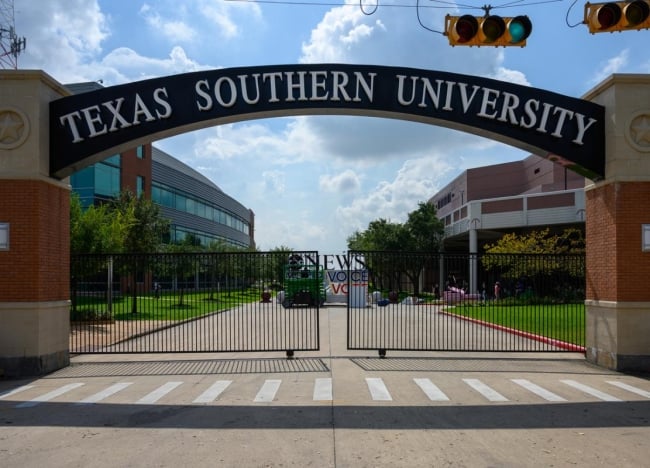You have /5 articles left.
Sign up for a free account or log in.

Texas Southern University gates
Istockphoto.com/michelmond
Last week the Texas Southern University Board of Regents reached a separation agreement with former president Austin Lane, following a lengthy mediation meeting. The decision to terminate Lane was made in early February, after the president was abruptly suspended a month prior.
The board’s decision to terminate Lane -- and a vague explanation as to why -- has sparked outrage among TSU students, alumni and staff. It also drew criticism from a fellow president of a historically black university: Walter Kimbrough.
Kimbrough, who has helmed Dillard University since 2012, slammed the board’s decision in an op-ed published in Diverse Education.
“The entire board must be replaced. Immediately. All Texas Southern supporters should pressure [Texas governor Greg Abbott] to make this happen,” Kimbrough wrote.
He recalled reports of an October board meeting, during which one regent, Ron Price, reportedly complained of being dropped off a block away from the university during homecoming. He also recounted reports of complaints that some board members sat in the back row at TSU’s Democratic presidential debate in September. Another regent, Wesley G. Terrell, said the regents “can terminate everybody, even down to the janitor, if it’s the will of the board.” Shortly after, the board approved new bylaws giving them the power to do just that.
Little information is public about Lane’s termination. Last week, the Texas attorney general ruled that TSU should release documents related to an admissions probe and Lane’s ouster, which were sought by the Houston Chronicle under the Texas Public Information Act. While the battle between the campus community and TSU’s board continues, Kimbrough has a message for aspiring TSU presidents looking to apply: don’t.
“Let me issue this public warning to anyone who would consider being president at Texas Southern. Stay away until they clean the board,” he wrote. “Don’t get caught up in the idea of wanting to be a president, because any president working under this board is asking for a tenure filled with micromanaged misery.”
Kimbrough's fiery op-ed, which has been widely circulated and praised on Twitter, was significant, according to Susan Resneck Pierce, president emerita of the University of Puget Sound and a consultant for colleges and presidents. She could only recall one other president, current or former, "speaking out in this way": former Cornell University president Hunter R. Rawlings III, in response to Teresa Sullivan's departure at the University of Virginia.
For his part, Kimbrough thinks presidents should be willing to make bold statements.
"I think presidents are too timid -- we don’t comment on anything," Kimbrough said.
He described two motivations for writing his op-ed. First, he wanted to serve as a defense for a president who otherwise had none. Faculty, he argued, can turn to the American Association of University Professors when they believe they’re being treated unfairly. There is no similar organization to support college presidents.
“Someone has to speak up for the presidents when these kinds of things happen,” he said. “This was just another situation where all of the reports that came out, all the news reports suggested that this wasn’t fair. Someone needed to step up and say, ‘This was wrong.’”
Pierce agrees the board is acting out of step with best practices.
“Based on the media reports about this, the board is behaving in an unusual -- if not inappropriate -- way that is not consistent with best practices,” she said. “They did not discuss with the president what their concerns were, and if they’re doing an investigation, the president needs to know that that’s happening.”
Among the board’s errors, Pierce highlighted the fact it failed to collaborate with the president on a statement about his termination and did not keep personnel matters confidential in the statement it did release.
Texas Southern did not respond to a request for comment Tuesday. In its public statement on Lane's termination, the board wrote that Lane's "actions relate in part to failure to report to the board information relating to improper payments for admissions to the Thurgood Marshall School of Law and for the improper awarding of scholarships to students, which led in part to the initiation of a comprehensive investigation." Lane has denied these allegations.
Kimbrough also wanted to put pressure on the state to reexamine TSU’s board before a new president is selected, and he believes a dismal applicant pool would do the trick.
“They should be left with a pool that’s so bad, they realize they have to change,” Kimbrough said.
Whether his message will actually deter applicants is up for debate. Jim Lyons is a senior consultant at the Association of Governing Boards and former member of Dillard University's Board of Trustees who has also served as interim president at Dillard and at the University of the District of Columbia. Lyons said that aspiring presidents will often prioritize opportunities over a good fit and blow past potential red flags from the board with which they’ll have to work closely.
“We see a lot of people that are so eager to be a president that they don't stop to look at whether it’s a good match,” Lyons said. “Sometimes during the search process, the candidate is so eager to become a president and the board is so eager to complete the search that some things may go unsaid.”
Lyons interpreted Kimbrough’s message as exactly that.
“One of the things in President Kimbrough’s comments is he’s saying to other presidents, ‘Don’t be so eager to be a president that you fail to look at how the president is onboarded, whether the school is a good match for you,’ etc., etc.,” Lyons said.
But Pierce noted that Kimbrough is a well-respected president. She believes that his op-ed could have “major impact on the applicant pool.” She went on to say that while some applicants will seek and accept any presidency, many candidates are highly selective in where they choose to apply -- and only apply to places they perceive to be a good fit.
“The board is every president's most important constituency, and without board support, presidents will not be able to be successful,” she said.




